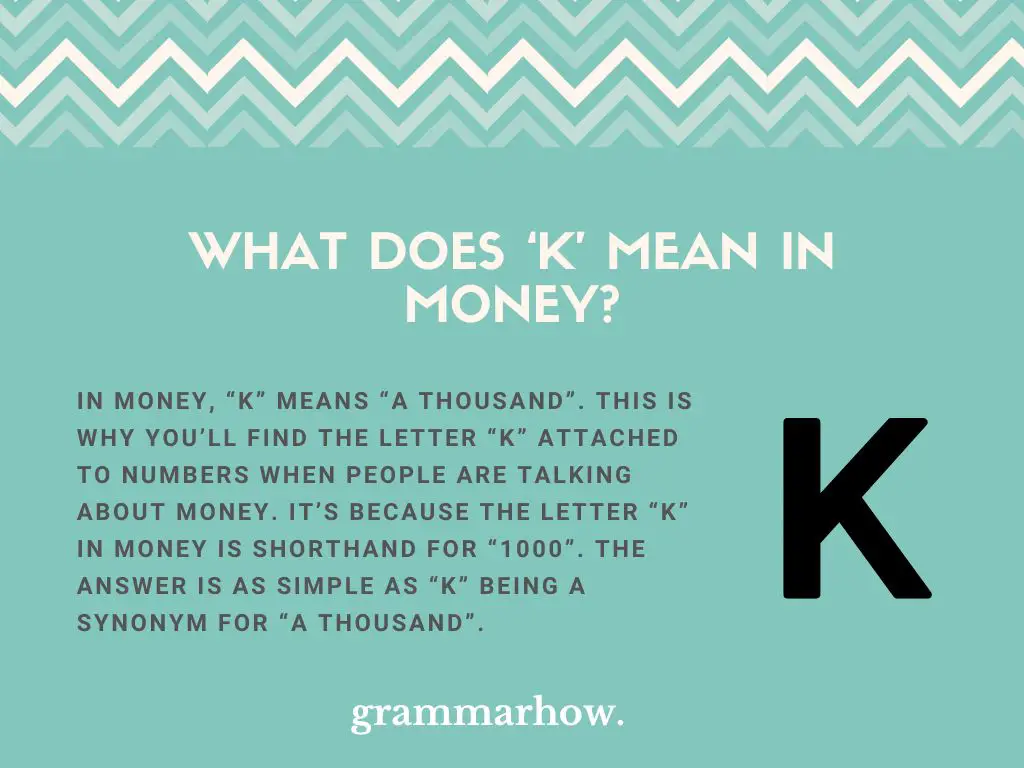Why is the letter “K” used when talking about large numbers? This is the sort of question you may have asked yourself in the past. It can be tricky to think of a logical answer. The truth is that there’s a completely reasonable answer that this article will give you.
What Does ‘K’ Mean in Money?
In money, “K” means “a thousand”. This is why you’ll find the letter “K” attached to numbers when people are talking about money. It’s because the letter “K” in money is shorthand for “1000”. The answer is as simple as “K” being a synonym for “a thousand”.

Therefore, whenever you see the letter “K” stuck next to a number, you can mentally exchange it for “1000”. Here are some examples of this:
- 1K = 1,000
- 10K = 10,000
- 100K = 100,000
- 1,000K = 1,000,000
“K” meaning “1000” in money is not slang. In fact, it’s a perfectly formal shortcut to use. Many people in business contexts use “K” to refer to “1000” to save time.
If you’re ever curious about how much “K” is, you can be sure that it always stands for “1000”.
Here are some example sentences to showcase the use of “K” as “1000” in conversation:
- I have 1K right now and I can get you the other 10K later.
- She’s going to get us 360K by doing this deal with their company.
- I can give you 10K right now but I can’t go over that number.
Why Is ‘K’ Used for 1000?
The letter “K” is used as a stand-in for “1000” because it comes from the word “kilo”. In math, a “kilo” is 1000. Therefore, in money, “K” means “1000” as well. This fact also applies to other similar terms, like “kilometers”, which are 1000 meters each.
Here are some examples that will help you understand this fact:
- Three kilos is 3000, which means that 3K is three thousand as well.
- 5K refers to five thousand, so five kilos will also be five thousand.
When Is It Appropriate to Use ‘K’?
“K” is appropriate to use in plenty of business situations. You can use “K” when talking about profits and income, and it’s completely appropriate. You should avoid using “K” when it’s important to be extremely precise. In those situations, you should write out the full number instead.
For example, if you’re drafting a contract, you should avoid using “K” and use the full number instead. Same with specifying an amount of money that should be transferred to someone.
Another situation where you shouldn’t use “K” is when you’re doing accounting of something. If you’re keeping a count of what your expenses and profit is, you should use full numbers instead.
Therefore, it’s always appropriate to use “K” in casual contexts. There are formal situations where you can use “K”, and situations where you can’t.
Other Nicknames for 1000
There are other nicknames that people use for 1000, depending on the context. Some of these exist in the money field, and some exist in others. Here are some of these different nicknames:
- Grand
- Band
- Fat stack
- Stack
- Bozo
‘K’ as a Currency
In Myanmar, “K” is used as an abbreviation for the currency of the country, named “kyat”. Therefore, if you see people using “K” in the context of currency, they might be referring to the Myanmar Kyat. It’s good to be aware of all these different facts
In English, you can use “K” as a synonym for “1000” when talking about any given currency.

Martin holds a Master’s degree in Finance and International Business. He has six years of experience in professional communication with clients, executives, and colleagues. Furthermore, he has teaching experience from Aarhus University. Martin has been featured as an expert in communication and teaching on Forbes and Shopify. Read more about Martin here.
